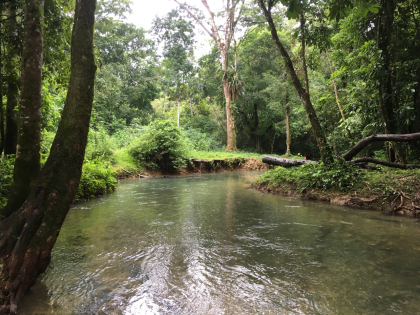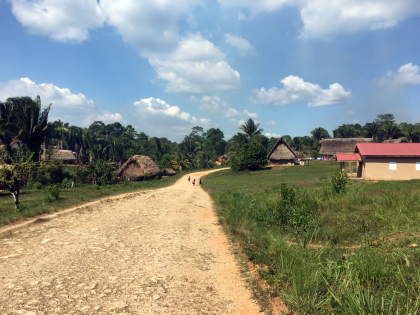This project has been completed. To read about the conclusion, CLICK HERE.
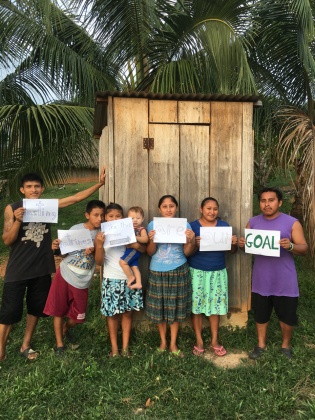 Location
Location
Otoxha Village, Toledo District, Belize
Community Description
Otoxha, named after the river that runs through the center of the village (“Otox” is Q’eqchi for “winding”, and “ha” means “water”), is a beautiful Mayan village located deep in the rain forest of southwest Belize. Otoxha is beautiful for the lush landscape, wonderfully rich culture, and friendly people. The 56 families, or about 300 people, who live there share the land that stretches about a mile and a half along a rocky unpaved road.
There is no source of income for most of the families because of the significant distance to the nearest town, which is four hours by bus, so almost every family uses the surrounding land for sustenance farming. Nonetheless, their culture, which focuses on family, religion, and togetherness leads them to live very productive and happy lives. They build amazing structurally sound houses out of the wood and leaves from the forest that closely surrounds the village and their farms usually produce an abundance of fruits and vegetables, especially corn. They provide themselves with everything they need to survive by their own hard work and collectivist culture.
In addition to the 56 households, the community consists of three very active Christian churches, a school for children ages 5 – 14, a community center, two rivers, a soccer field, a health post, and five small shops that are run out of villagers’ homes. Popular activities for villagers, when they are not farming, taking care of their houses and families, or visiting friends, including playing sports, like volleyball during the rainy season and soccer during the dry season, and creating intricate crafts like bracelets, necklaces, baskets, and shoulder bags out of locally available materials.
Problem Addressed
Diarrheal diseases are commonplace in many Mayan villages in southern Belize, as is true for other less-developed regions of the world. In this village, however, the cause is specific to improper disposal of human waste leading to an unhygienic environment. About three out of every four villagers use the dense forest that closely surrounds the village to defecate, leading to the easy spread of diarrheal diseases. These diseases result from children playing outside with bare feet, the contamination of rivers where people bathe and wash daily, animals roaming freely, the contamination of drinking water.
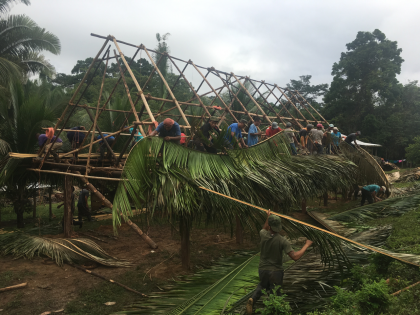 Worldwide, diarrheal diseases are a leading cause of morbidity and mortality for children 0-5 years of age, and rural villages in Belize, like Otoxha, are no exception. The lack of public health infrastructures, such as latrines and running water, making it very difficult for villagers to practice good hygiene. The resulting diarrheal diseases lead to malnourished and stunted children, issues that can affect sufferers for their entire lives. To combat this, some families have acquired enough money to build long-lasting latrines, but most families do not have that luxury because only minimal amounts of money circulating in this small village.
Worldwide, diarrheal diseases are a leading cause of morbidity and mortality for children 0-5 years of age, and rural villages in Belize, like Otoxha, are no exception. The lack of public health infrastructures, such as latrines and running water, making it very difficult for villagers to practice good hygiene. The resulting diarrheal diseases lead to malnourished and stunted children, issues that can affect sufferers for their entire lives. To combat this, some families have acquired enough money to build long-lasting latrines, but most families do not have that luxury because only minimal amounts of money circulating in this small village.
Project Description
This project is to build 25 latrines in the village.
After a needs assessment done by the village’s Community Health Worker and Peace Corps Volunteer determined that 44 families are without latrines and all of them want to contribute to a village-wide latrine project, a latrine committee was formed to analyze the results of the needs assessment and plan a project to meet this need. After months of planning, the latrine committee is proposing a project that will build 25 latrines to be strategically placed in locations that will service all families without current latrine access. Prior to building the latrines, the Public Health Inspector will approve each latrine building site in accordance with hygiene specifications to avoid contamination of drinking water, family gardens, or other possible locations for contamination.
The community will provide the wood, skills, tools, and labor to build the latrines while the grant will allow the latrine committee to purchase other needed materials like sand, cement, zinc, nails, and steel. Skilled carpenters who have successfully built latrines for their families in the past, along with the guidance of skilled professionals from the Maya Mountain Research Farm, will provide technical expertise on building latrines.
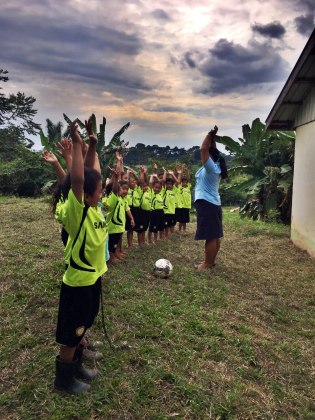 Families will be educated on how to build latrines in a group setting, then at least one skilled carpenter, in addition to other volunteers, will be present when building each latrine. For this reason, latrines will be built slowly, two per week, after the holes are dug to allow the limited number of tools and those with the expertise to help each and every family building a latrine instead of exhausting those resources over a shorter period of time.
Families will be educated on how to build latrines in a group setting, then at least one skilled carpenter, in addition to other volunteers, will be present when building each latrine. For this reason, latrines will be built slowly, two per week, after the holes are dug to allow the limited number of tools and those with the expertise to help each and every family building a latrine instead of exhausting those resources over a shorter period of time.
This project will provide the health committee in Otoxha an opportunity to teach extensively about the prevention and treatment of diarrheal diseases as well as proper hygiene practices related to latrine usage. Once project funds are secured, health leaders in the village will hold a workshop for the entire village to learn about diarrheal disease prevention and treatment and proper hand-washing technique.
The second educational session will inform just the beneficiaries of the project about building and maintaining hygienic latrines, including latrine placement requirements, latrine building, hole digging, and latrine cleaning/maintenance. This education, combined with significantly increased access to latrine usage, will decrease the prevalence of diarrheal diseases in Otoxha and, in the long term, improve the health of the community as a whole.
Project Impact
225 people will benefit from the project.
Peace Corps Volunteer Directing Project
William Boyer
Monitoring and Maintenance
Since the inception of this project, sustainability has been at the forefront of village leaders’ and the PCV’s minds because, if this project is going to be truly successful, it will not only build latrines to decrease diarrheal diseases, but it will pave the way and set an example for future projects in the village. This is important because latrines eventually fill up and more will need to be built in the future without the PCV present.
Village leaders have been significantly involved in every aspect of the project so far by completing and analyzing the needs assessment, writing this grant proposal, attending workshops, planning the project, and mobilizing the community. During the implementation of the project, the village’s service providers, leaders, and project beneficiaries will all be trained on latrine building and maintenance by skilled carpenters and the PCV, as well as the Mayan Mountain Research Farm in Stan Creek, Belize. In addition, the skilled carpenters in the village have agreed to make repairs to the latrines in the future if needed.
To ensure the continued success of this project after the building is complete, the latrine committee will check the beneficiary’s competence in latrine site identification, latrine building, latrine maintenance, causes of diarrhea, prevention and treatment of diarrhea, and proper handwashing technique after the educational sessions are complete. This will ensure families can successfully build latrines in the future.
Lastly, the latrine committee will periodically visit families at 1 month, 3 months, and 6 months after the completion of each latrine to ensure the proper usage and maintenance of the facility. This will also allow families to ask questions and the latrine committee to further encourage proper hygiene practices.
Project Funding
This project was funded through the generosity of the Paul Bechtner Foundation.
